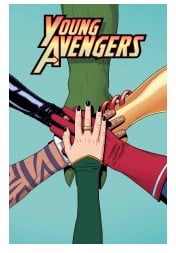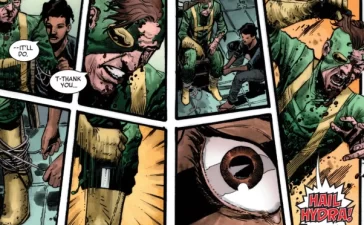
Young Avengers Grow into Maturity
“Come & play the tunes of glory—raise your voice in celebration of the days we have wasted in the café in the station & learn the meaning of existence in fortnightly installments. Come share this golden age with me in my single room apartment & if it all amounts to nothing—it doesn’t matter, these are still our glory days.” –Jarvis Cocker, “Glory Days”
With #13 last week Young Avengers came closer to its ending, giving readers a rollickin’ climax to a year’s worth of narrative. We still have two issues of the series to go, a two-part after-party which promises to tie up a few loose ends and, hopefully, leave us with a satisfying sense of closure. When this series debuted in January, I was familiar with few of its characters, mainly viewing it as a continuation of Kieron Gillen’s brilliant Kid Loki run on Journey into Mystery. I quickly fell for all the members of this team of misfits, and will miss them when the series wraps up next month. For its 13-month running time, it has been one of the best comics on the racks.
In the backmatter to the first issue, Gillen offers his take on the characters, explaining that for him the key difference between his series and the previous Young Avengers is a matter of age. The first was about being 16, while his is about being 18. Only two years, but, in his eyes, a “difference telling and profound.” Gillen’s title is not about the Young Avengers’ relationship with the adult heroes they have looked up to in the past (or in the case of Wiccan/Billy is their literal parent), but how they find strength and inspiration from each other. They are no longer dreaming of joining adult life, but taking their first steps into that brave new world of maturity. It is a moment flush with excitement, the thrill of believing they can achieve anything, if only they put their mind to it.
Only it’s never that simple. Part of becoming an adult is not merely being able to chase our dreams, but also accepting that the world is not, and never will be, perfect. We can make it better, but it involves sacrifice. What is it they say about the non-existence of free lunches? Come to think of it, Kid Loki spent a lot of time in diners consuming food and shakes that he had zero intention of paying for . . .
When Matt Fraction first brought Loki back from the dead a young boy, I rolled my eyes. Just like most of Fraction’s run on Thor, it made precious little sense. Still, I picked up the first issue of Journey into Mystery featuring Kid Loki, and instantly changed my mind about him. In Gillen’s hands he became one of the most fascinating, manipulative, charming characters in comics, exactly what we would expect from a young god of mischief. At the same time, though, Gillen added a new layer with the idea that this incarnation of Loki was trying to escape his past and carve out a new identity for himself as a nobler individual. Nobody may believe him; at times he doubts his own intentions, fearing he is predestined by nature to play the deceiver. The results are both funny and moving. (If you haven’t read this run yet, I cannot recommend it enough).
Kid Loki’s arc continues through Young Avengers, where (in a clever variation on the old trope of Loki bringing the original Avengers together), he assists our heroes in dealing with an inter-dimensional threat named Mother. Only, well, it comes out eventually that Loki was in league with this creature bent on conquering Earth, and manipulated Wiccan into unleashing her so that he, Loki, could augment his powers to new levels. Indeed, he does get his power upgrade, along with a new, more mature body. I could be cynical about the departure of Kid Loki and his new appearance bearing a closer resemblance to, say, Tom Hiddleston, only it works within the story. Loki has aged beyond childhood into a young adult. As part of the process, he even admits his blame regarding Mother, literally confronting his guilty conscience and causing a pressing threat to evaporate. However, one of the lessons of maturity is that simply saying you’re sorry is not always good enough. Sometimes when you hurt someone, they stay hurt, regardless of how sincere you may or may not sound afterwards. Loki triumphed; he got most of what he sought. Is he satisfied? A chance at camaraderie has slipped through his fingers, leaving him alone. When Teddy asks where Loki was after the battle, I could not help but feel something, as, while watching from far away, the god replies to himself “He’s gone.”
Teddy, aka Hulking, is one of the characters, Loki most immediately manipulated by suggesting his love for Wiccan was a byproduct of Wiccan’s reality shaping powers. Billy and Teddy’s relationship was the most tender aspect of the series. In #13 Prodigy finally snaps Teddy out of his Loki-induced funk. Prodigy asks what it could be that Teddy is worried about. That his boyfriend has (knowingly or not) cast a magic spell over him, making Teddy irrationally drawn to him, filling him with an intense desire for the other’s companionship? Well, “what do you think love is?” There are some things which cannot be explained, or filed away in neat categories. That’s part of life. In the end, it doesn’t matter how Teddy’s emotions came about. The important thing is what they are and that because of them, maybe just this once, despite Loki’s groaning, “love really [is] going to save us all.”
What also saves them is a lesson Billy teaches himself. Now that his powers have fully manifested themselves, he could literally reshape all reality around him, only he chooses not to. He accepts not only a responsibility to act, but also a knowledge of what his limitations are. He is no longer the reckless youth who believes that no harm can come from good intentions, which is partially how they ended up in this mess in the first place. He acknowledges his potential as well as a need to master it better. Life is a process of growing, inching ideally, towards something better through trial and error. For the members of the Younger Avengers over the course of the past year that has definitely been the case. They, as well as their readers, are better off for it.
And so, on to the after-party (it seems Kate and Noh-Varr may have some personal matters to discuss) . . .








